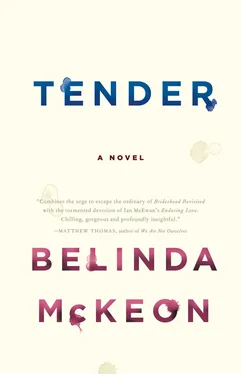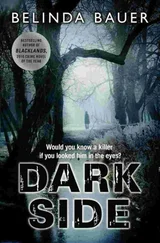“He’s not out, Conor,” she said, a whine in her voice. “He’s not—”
“I don’t give a shit what he is. What business is it of mine?”
“He’s not fair game for that kind of slagging in the same way that everyone else is. That kind of public slagging. Slag me as much as you want, and slag Zoe and Emmet and Aidan…”
Conor’s face creased with irritation. “I couldn’t be bothered slagging any of you,” he said. “I’m gone. I have better things to do than deal with this nonsense.” As he strode out of the Buttery, he met Emmet at the door, and Catherine saw Conor shake his head, and say something to Emmet, and in the next moment Emmet’s eyes shot to her; she leaned in to the bar and wiped, with her thumb and index finger, at her eyes. She had recovered by the time he reached her, and she was able to turn to him, narrowing her gaze with pretended displeasure at the sight of him, ready for whatever wisecrack he was getting ready to roll her way.
“Come on, Poetess,” he said. “Let’s go somewhere we can get a pint that’s not made up from the dregs. Are you barred from the Stag’s?”
Emmet, out of his usual environment — not, of course, that the Stag’s was out of his usual environment, but it was not, at least, on campus — was different. Not radically different; he still called Catherine “Poetess,” and when he was not calling her that he was goading her about being a culchie, and before they’d even been served their pints he had made several statements about people which, in print, would almost certainly have constituted libel, but he was different. He was more hesitant, somehow; that was how Catherine would have put it, if she had been asked to — and she realized that, automatically, in her mind, she was shaping this thought about the difference in him as she might have written it in a letter to James. She could tell James about it in person later, naturally — she would have to tell him, since she would need to explain to him where she had suddenly disappeared to — but that was not the same. She preferred the idea of putting it in a letter, the story of how Emmet had come up to her in the Buttery (she would, of course, leave out the part about James sitting, laughing, at a nearby table), and about how she had walked with him, keeping up a wry, sarcastic banter, across Front Square and up Dame Street and down the little tiled alleyway that led to the Stag’s Head, and about how they had found a table in the snug, where there were hardly ever any free tables, and about how the decrepit taxidermied fox had looked down on them, and how Emmet had gone to the bar and come back with two pints.
It was a kind of holding back, she thought, this new hesitancy; a kind of pause. He was not actually holding back — he was not sitting there, tongue-tied, or boring, or having decided that he did not want to talk to her after all — but there was something; she could not put her finger on it. It was as though, even as they spoke, he was not fully listening to her, or talking to her, but watching her — watching her in the way you might watch someone if they were talking to someone else, if they were part of a conversation on the other side of the table from you, safe to look at, safe for you to think your thoughts about, without them having to know.
He smiled more often, too; that was something else about him. And not the manic grin of The Doyle as he marched around campus, trailing trouble, but a smile she did not remember seeing him smile before. What did he need with that grin, she found herself wondering, when he had a smile like this? It was almost sweet. It was almost shy. Although you could not say that of Emmet Doyle, really, no matter how nicely he smiled after a few mouthfuls of Guinness, no matter how his blush might sometimes betray him.
“So,” he was saying, and now the smile had disappeared again and the grin was back in its place. “I read the rest of your interview with the guy from Monaghan. It was actually pretty good.”
“Thanks,” Catherine said, surprised.
“He sounds like fun.”
“Yeah. He’s gas.”
“Gas,” he repeated, in an exaggerated rural accent. “Did he mind that you hadn’t read the book?”
She glanced at him. “What?”
“You were obviously winging it! The poor guy clearly didn’t know where to look.”
“Listen, Doyle,” Catherine said, pointing a finger at him. “Unlike you, I don’t actually just make stuff up.”
“Well,” he said, “that’s your first mistake,” and, lifting his pint, he made as though he was going to toast her, but switched instead, just as her glass was approaching his, to the fox.
“So,” he said, after they had gone through what publications office gossip they could muster, Emmet recreating in vivid detail the 5 a.m. panic attack of Derek Galvin, the TN editor, as the entire sports section had deleted itself before his eyes, “did your mate have your dinner ready for you when you got home last night?”
“Well, there was toast,” Catherine said, which was a lie — James had made shepherd’s pie for everyone the night before — and one she had not intended to tell, but it had just come out for some reason, perhaps because it had seemed funnier, because it would make Emmet laugh, the way he was laughing now, his face lit up with pleasure, his eyes bright.
“He must have had an amazing time in Berlin, did he?” he said after a moment. “Your mate.”
“James.”
“James,” he said, with a mock-formal nod. “What was he doing over there?”
“He’s an artist,” Catherine said, hearing how her voice had thickened with the importance of the phrase; she cleared her throat. “He was working for a really famous photographer over there. Malachy Clark.”
“Well, I’ve never heard of him, and I’m a very well-known patron of the arts, so he can’t be that famous.”
“Do you ever talk seriously about anything?” Catherine said, frowning at him over her glass. She had meant it as another joke, but as soon as she had said it she realized that he would probably not take it that way, and she saw already the blush on his face, a bloom and blotch of crimson at the tops of his cheeks, and she felt bad.
“Sorry,” she started to say, but he cut across her.
“Sorry, you’re right. Well, did James have a good time over there? It must have been an amazing year for him, was it?”
“Well,” she said, swallowing. “I mean, I think it was all right.”
“Only all right? I’d fucking love to spend a year in Berlin. How could it be only all right?”
She shook her head, feeling a rush of annoyance with herself; how had she walked right into this? “It’s complicated,” she said, waving the question off. “I don’t really want to talk about it. I mean, James is gay, for one thing.”
Guilt flooded her instantly; she had done it again, and silently she started to berate herself, but her attention was distracted by Emmet’s wide-eyed, enthusiastic nodding.
“Oh,” he was saying. “OK. OK. So your friend’s gay. That’s — great. That’s cool! That’s really great, Reilly. That’s cool.”
“He’s going to be gay whether you think it’s great or not, Doyle.”
He looked uncertain. “What do you mean?”
“I mean, you don’t have to give him your approval.”
The same uncertainty lingered on his face then, but in the next instant it had vanished, replaced by his grin. “He doesn’t have my approval, the deviant,” he said, archly. “Running around hugging innocent culchies and taking photographs of, what, probably naked men, is it?”
“Very funny.”
“Not one bit funny, Reilly. Does your mother know you’re gadding about with homosexual men?”
Читать дальше












